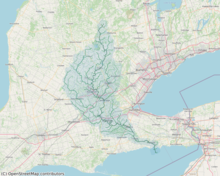| Grand River | |
|---|---|
 Grand River meandering north of West Montrose | |
 Watershed of Grand River in Ontario | |
| Location | |
| Country | Canada |
| Province | Ontario |
| Physical characteristics | |
| Source | |
| • location | Near Dundalk, Ontario |
| • elevation | 525 m (1,722 ft)[1] |
| Mouth | |
• location | Lake Erie at Port Maitland |
• elevation | 174 m (571 ft)[1] |
| Length | 280 km (170 mi)[1] |
The Grand River, formerly known as the River Ouse, is a large river in Ontario, Canada. It lies along the western fringe of the Greater Golden Horseshoe region of Ontario which overlaps the eastern portion of southwestern Ontario, sometimes referred to as Midwestern Ontario, along the length of this river. From its source near Wareham, Ontario, it flows south through Grand Valley, Fergus, Elora, Waterloo, Kitchener, Cambridge, Paris, Brantford, Ohsweken, Six Nations of the Grand River, Caledonia, and Cayuga before emptying into the north shore of Lake Erie south of Dunnville at Port Maitland. One of the scenic and spectacular features of the river is the falls and Gorge at Elora.
The Grand River is the largest river that is entirely within southern Ontario's boundaries. The river owes its size to the unusual fact that its source is relatively close to the Georgian Bay of Lake Huron, yet it flows southwards to Lake Erie, rather than westward to the closer Lake Huron or northward to Georgian Bay (most southern Ontario rivers flow into the nearest Great Lake, which is why most of them are small), thus giving it more distance to take in more water from tributaries.
The river's mostly rural character (even when flowing through the edges of Waterloo and Kitchener), ease of access and lack of portages make it a desirable canoeing location, especially the stretch between West Montrose and Paris. A number of conservation areas have been established along the river, and are managed by the Grand River Conservation Authority.
The Grand Valley Trail stretches 275 km along the river's valley between the town of Dundalk and Lake Erie.
In 1669 the indigenous name ''Tinaouatoua'' was recorded by Galinée.[2] A 1945 book about the Grand River recorded the spelling 'Tinaatoua' and attributed it to the Seneca, though its sources are unclear.[3]
The Mohawk name for the Grand River, ''O:se Kenhionhata:tie'' means "Willow River," for the many willows in the watershed. During the 18th century, the French colonists named it ''Grande-Rivière. It was later renamed as Ouse River by John Graves Simcoe for the River Great Ouse near his childhood home in Lincolnshire on the east coast of England. The anglicized form of the French name has remained in common use.
The Ojibwe name for Grand River is Owaashtanong-ziibi[citation needed]. A. Jones, the General Surveyor of Upper Canada reported the name of the river among the Mississaugas to be 'O-es-shin-ne-gun-ing', and he wrote "the one that washes the timber down and carries away the grass and the weeds" as the meaning of the name. [4][5]
- ^ a b c "GRCA - About the Grand River - -". Archived from the original on 2015-02-06. Retrieved 2008-10-21.
- ^ Wintemberg, W. J. (1927). "Origin of the Place and Stream Names of Waterloo County, Ontario" (PDF). Annual Report of the Waterloo Historical Society. 15: 375. Retrieved 2024-09-19.
- ^ Dunham 1945, p. 32.
- ^ Mississaugas of the Credit First Nation, Augustus Jones’ "Documentation of River and Creek Names, 1796", Link
- ^ Dunham 1945, p. 61.